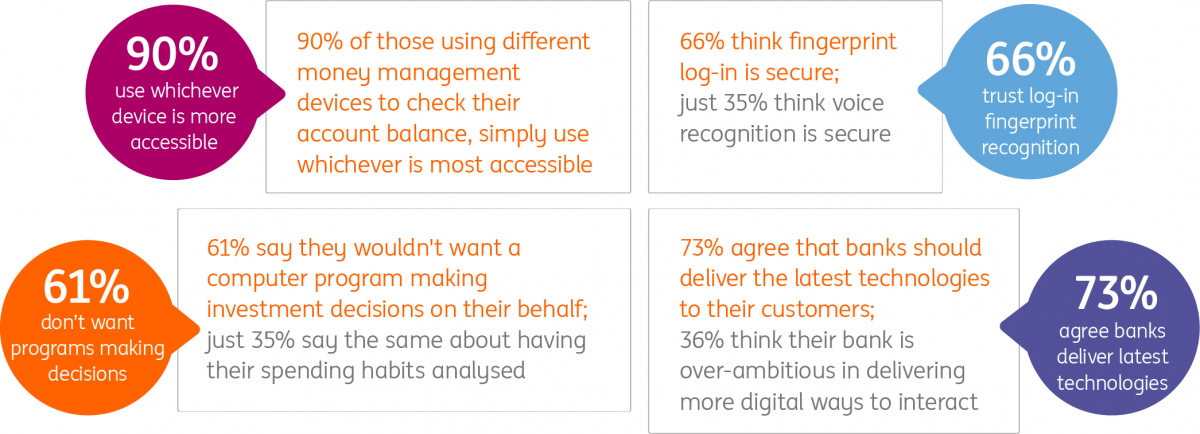Mobile banking 2019: Tech in banking in strong demand but adopted with care
Our 7th annual ING international Survey on attitudes towards financial technologies is a story of the steady adoption of mobile banking, albeit with some natural hesitation, and continued consumer interest in tech. Download the full report below:
Executive summary
Europeans are wary of new technology in banking, despite the high demand. That's the core finding from the latest ING International Survey.
We find that:
- 65 percent of Europeans have never used fingerprint or voice recognition to log into their bank’s app
- Just 52 percent rate face recognition as secure and only 35 percent rate voice recognition as secure
- 70 percent still go into a branch to access services from their main banking provider
- Yet, 73 percent agree that banks should deliver the latest technologies to their customers and 77 percent believe that banks should work together to ensure the latest payment systems work everywhere
ING’s 7th annual survey on attitudes towards financial technologies is a story of the steady adoption of mobile banking, albeit with some natural hesitation, and a continued consumer interest in tech.
There is room for new players to enter the field. Even though many consumers remain with just one bank, a similar amount now use additional financial service providers, too. New players are often heavily focused on tech and could further boost the use of new banking technologies.
In this report, we examine the technological trends and how people in different countries are responding to them. We look at the curve of adoption, issues around data sharing, 'automated' banking and FinTech.
Some findings at a glance

Download
Download report
15 May 2019
What’s happening in Australia and around the world? This bundle contains 6 Articles"THINK Outside" is a collection of specially commissioned content from third-party sources, such as economic think-tanks and academic institutions, that ING deems reliable and from non-research departments within ING. ING Bank N.V. ("ING") uses these sources to expand the range of opinions you can find on the THINK website. Some of these sources are not the property of or managed by ING, and therefore ING cannot always guarantee the correctness, completeness, actuality and quality of such sources, nor the availability at any given time of the data and information provided, and ING cannot accept any liability in this respect, insofar as this is permissible pursuant to the applicable laws and regulations.
This publication does not necessarily reflect the ING house view. This publication has been prepared solely for information purposes without regard to any particular user's investment objectives, financial situation, or means. The information in the publication is not an investment recommendation and it is not investment, legal or tax advice or an offer or solicitation to purchase or sell any financial instrument. Reasonable care has been taken to ensure that this publication is not untrue or misleading when published, but ING does not represent that it is accurate or complete. ING does not accept any liability for any direct, indirect or consequential loss arising from any use of this publication. Unless otherwise stated, any views, forecasts, or estimates are solely those of the author(s), as of the date of the publication and are subject to change without notice.
The distribution of this publication may be restricted by law or regulation in different jurisdictions and persons into whose possession this publication comes should inform themselves about, and observe, such restrictions.
Copyright and database rights protection exists in this report and it may not be reproduced, distributed or published by any person for any purpose without the prior express consent of ING. All rights are reserved.
ING Bank N.V. is authorised by the Dutch Central Bank and supervised by the European Central Bank (ECB), the Dutch Central Bank (DNB) and the Dutch Authority for the Financial Markets (AFM). ING Bank N.V. is incorporated in the Netherlands (Trade Register no. 33031431 Amsterdam).